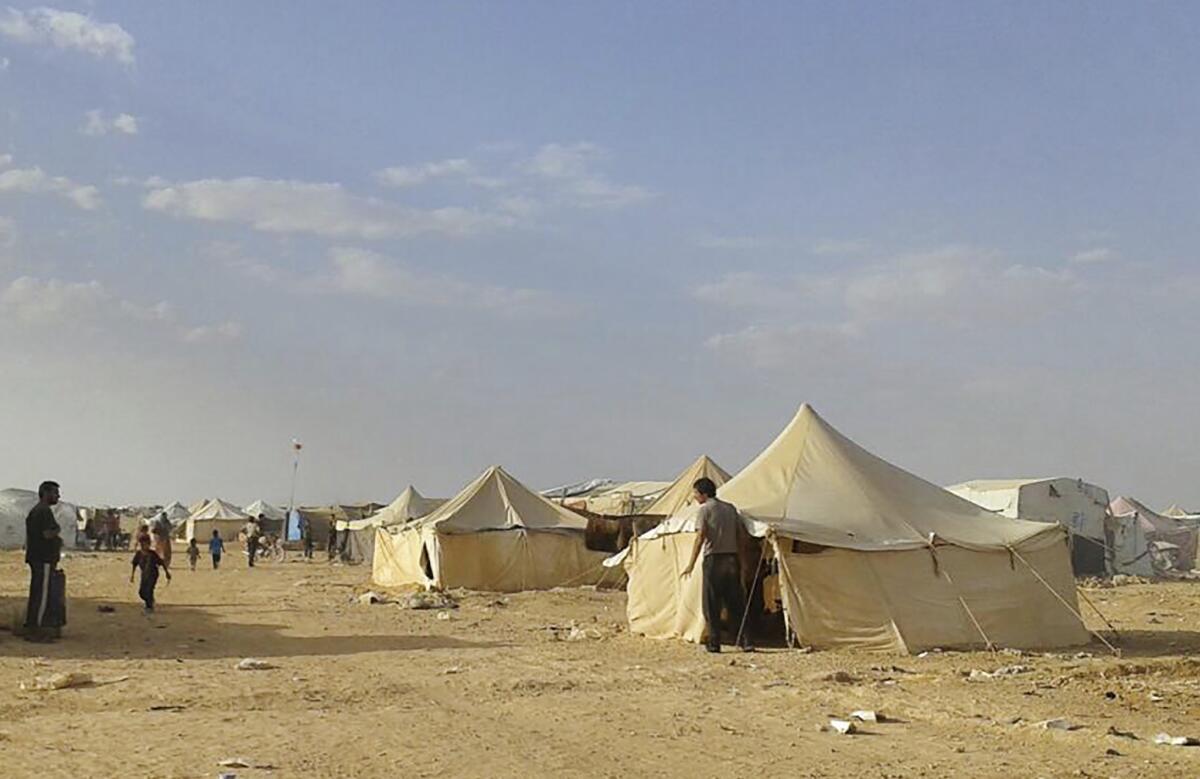Jordan to allow aid drops to Syrians stranded at border

Reporting from AMMAN, Jordan and BEIRUT — Jordan is willing to allow regular aid drops by crane from its territory to tens of thousands of Syrians stranded at the sealed desert border between the two countries, the government spokesman said Monday.
The comments by Mohammed Momani signaled an apparent shift in Jordan’s position in talks with international aid agencies over access to the displaced.
However, two aid officials said nothing has been finalized. They spoke on condition of anonymity because talks are ongoing.
The pro-Western kingdom sealed its border with war-torn Syria in June, after a deadly cross-border attack claimed by Islamic State extremists killed seven members of the Jordanian security forces. This has left more than 75,000 Syrians stuck between a war zone and a sealed border, without regular access to food, water and medicine.
The displaced live in two makeshift tent camps in an area where the frontier is marked by two parallel low earthen walls, or berms. Conditions have become increasingly dire, with aid officials reporting the spread of disease, including whooping cough and hepatitis.
Before the border closure, aid was sent from Jordanian soil. In August, Jordan permitted an aid drop by crane, in what was described at the time as a one-off shipment.
U.N. agencies have since proposed setting up an aid distribution center three to four miles west of the largest encampment, known as Rukban, within the strip marked by the two berms, an aid official said. This would presumably have drawn the Syrians away from a Jordanian military base that is close to Rukban.
However, Momani told the Associated Press on Monday that this is no longer being considered.
“The new mechanism will be delivering aid on the berm through cranes, and the aid will be given to community leaders of groups of Syrians so they can distribute it accordingly,” he said, adding it would be up to the aid agencies to decide on the pace of shipments.
Momani said the border will remain sealed, citing an ongoing security threat to Jordan. The camps at the berm have been infiltrated by criminals, smugglers and extremists, he said.
“You can describe part of it as a Daesh enclave,” he said, referring to the extremist Islamic State group by its Arabic acronym.
The two aid officials said nothing has been agreed on. One of the officials, who has direct access to the talks, said he was not aware of an emerging agreement on crane drops. He said another meeting was set for Tuesday.
The suffering at the berm has caused some friction between Jordan and the international community.
Aid agencies have been pressing for a resumption of aid from the Jordanian side.
Jordan has said the international community needs to take responsibility for those stranded at the berm, and that the kingdom has already done more than its share in taking in Syrian refugees. In the past, Jordan has argued that this aid needs to come from Syrian territory, not Jordan.
Momani said Jordan has taken the “moral high ground” by offering to help.
Close to 5 million Syrians fled civil war in their country since 2011, including close to 660,000 who settled in Jordan.
Meanwhile, the international medical aid agency Doctors Without Borders is pleading for access to treat the wounded in the eastern, rebel-held parts of Syria’s Aleppo even as government forces press on with their offensive to retake that part of the city.
The agency, which supports eight hospitals in Aleppo’s besieged eastern quarters, says only 35 doctors are left serving in eastern Aleppo, amid an estimated population of 275,000.
The organization, which also goes by its French acronym MSF, said on Monday that the medical workers in Aleppo are exhausted and that facilities are overstretched and facing an impending fuel shortage.
Syrian government forces and their allies have kept eastern Aleppo under siege since July. The U.N. has warned that the Aleppo bombardment by Syrian and Russian warplanes could leave thousands dead by the year’s end.
More to Read
Sign up for Essential California
The most important California stories and recommendations in your inbox every morning.
You may occasionally receive promotional content from the Los Angeles Times.










